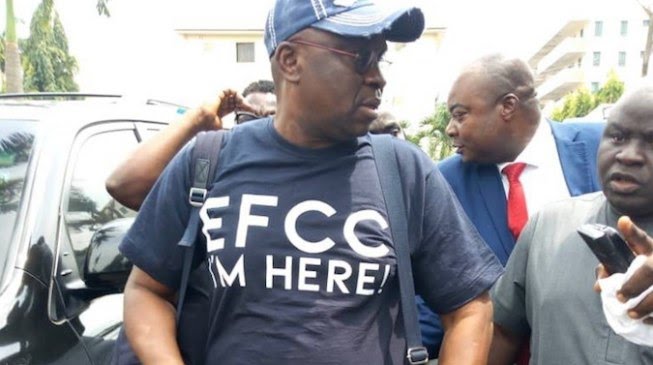
Justice Chukwujekwu Aneke will on November 28 decide whether or not to allow the Economic and Financial Crimes Commission (EFCC) to replace one of his witnesses, allegedly compromised by a former Governor of Ekiti State, Ayodele Fayose.
Justice Aneke fixed the date for ruling after the counsel to the EFCC, Rotimi Jacobs, accused Fayose of going behind to threaten and influencing one of the prosecution witnesses to charge his testimony.
Jacobs, therefore, told the court that the prosecution had decided to use another witness in the place of the one allegedly compromised by Fayose.
The lawyer claimed that the defendant went behind to meet and threaten the witness, Adewale Aladegbola, a bullion van driver with Zenith Bank, Ado-Ekiti branch.
He submitted that as a result of the alleged threat and compromise, when Aladegbola appeared before Justice Mojisola Olatoregun, the former judge hearing the case, the witness turned around in his testimony to give a different evidence from what he wrote in his statement at the EFCC office during investigation.
Jacobs said, “It is only in our country that this type of things happen; the witness before Olatoregun J., was compromised by this defendant,” Jacob said.
He accused Fayose of attempting to pervert the course of justice, saying, “If not because of my intervention, this defendant would have been facing another charge.”
Read Also: We Counted Fayose’s N1.2b For 10 Days- Zenith Bank Tells Court
But Fayose’s lawyers, Ola Olanipekun (SAN) and Olalekan Ojo (SAN), had earlier opposed the attempt to replace Aladegbola with Johnson Abidakun, who is the Head of Operations, Zenith Bank, Ado-Ekiti branch.
They had argued that the prosecution did not have the liberty to change a witness just because such a witness failed to give evidence favourable to them.
The two senior lawyers argued that the attempt to substitute Aladegbola with Abidakun as an abuse of prosecutorial power by the EFCC.
They urged Justice Aneke to stop Abidakun from testifying in place of Aladegbola, who had earlier testified before Justice Olatoregun.
However, Jacobs maintained that the proceedings before Justice Olatoregun were no longer relevant as the matter had started afresh when the case was transferred to Justice Aneke.
“To prevent this witness from testifying will run afoul of Section 379 of the Administration of Criminal Justice Act, 2015,” Jacobs argued.
After listening to the parties, Justice Aneke adjourned till November 28, 2019 for ruling.
The EFCC claimed in the charge that on 17th June, 2014, Fayose and one, Abiodun Agbele, were said to have taken possession of the sum of N1.2 billion, for purposes of funding his gubernatorial election campaign in Ekiti State, which sum they reasonably ought to have known formed part of crime proceeds.
Fayose was alleged to have received a cash payment of the sum of $5 million (about N1.8 billion) from a former Minister of State for Defence, Senator Musiliu Obanikoro, without going through any financial institution and which sum exceeded the amount allowed by law.
He was also alleged to have retained the sum of N300 million in his bank account and took control of the aggregate sums of about N622 million which sum he ought to have known formed part of crime proceeds.
The former governor was also alleged to have procured De Privateer Ltd and Still Earth Ltd, to retain the aggregate sums of N851 million in his bank account which they reasonably ought to have known formed part of crime proceeds.
Besides, the accused was alleged to have used the aggregate sums of about N1.6 billion to acquire property in Lagos and Abuja, which sums he reasonably ought to have known formed part of crime proceeds.
The accused was also alleged to have used the sum of N200 million, to acquire a property in Abuja, in the name of his elder sister Moji Oladeji, which sum he ought to know also forms crime proceeds.
The offences contravenes the provisions of sections 15(1), 15 (2), 15 (3), 16(2)(b), 16 (d), and 18 (c) of the Money Laundering Prohibition Act 2011.
